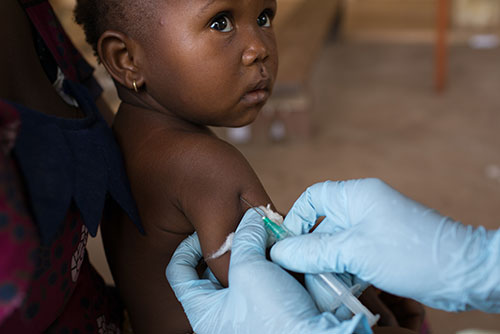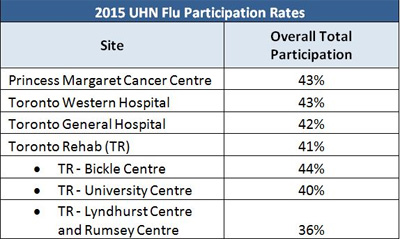
Every flu shot received during this year’s UHN Flu Campaign meant an essential vaccine and clean water was donated to a child in a developing country, through UNICEF Canada. Since 2000, UNICEF has supported the vaccination of 440 million children in the world’s poorest countries. (Photo: © UNICEF NYHQ2015-1149 Bindra)
Congratulations, UHN! The 2015 Flu Campaign is complete and we've vaccinated a total of 7,679 UHN staff members.
This year's UHN Flu Campaign supported a global health and safety initiative, organized through UNICEF Canada.
 For
every flu shot received by a UHN staff member throughout the Flu Campaign, we donated one essential vaccine to a child in a developing country.
For
every flu shot received by a UHN staff member throughout the Flu Campaign, we donated one essential vaccine to a child in a developing country.
For
every 50 flu shots received at UHN, we donated a five-month supply of clean water through 73 water purification tablets, to a child in need.
Since we vaccinated a total of 7,679 UHN staff members during this year's Flu Campaign, UHN is donating the following:
- 7,679 children in need are receiving essential vaccines
- 153 children in need are receiving a five-month supply of clean water through a package of 73 water purification tablets
This year, receiving your flu shot meant taking a step towards protecting yourself, your family, our patients and children around the world.
Can I still get my flu shot?
Yes. If you didn't receive your flu shot during the Flu Campaign, it is still available at all Occupational Health and Safety clinics across UHN until Thursday, Dec. 31.
Every year, one of the UHN hospitals is awarded the annual Flu Campaign trophy for having the highest participation rate. The participation rates will continue to be counted until Dec. 31. The annual Flu Campaign trophy is still up for grabs.
You can also still receive a full-sized chocolate bar while supplies last!
Why do I need to get the influenza vaccine?
Getting the flu vaccine is one part of a wellness strategy to keep you healthy this season. In addition to getting vaccinated, we encourage you to do the following:
- Wash your hands regularly
- Get enough sleep every night
- Commit to a balanced and nutritious diet
- Exercise frequently
- Practice stress reduction exercises
- When interacting with patients, wear the necessary personal protective equipment such as surgical masks, goggles, gowns and gloves
Influenza is one of the top 10 infectious diseases in Ontario. While most healthy adults feel sick for a few days, for others, influenza can be serious or life-threatening. Those most at risk include adults age 65 and over, residents of long-term care facilities, pregnant women, children under the age of five, people who are immune-compromised and people with chronic medical conditions including asthma, heart disease, and diabetes, among others.
Thank you, UHN, for supporting our local and global communities, and for making every shot count.
